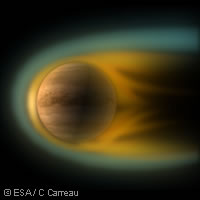Scientists search for Venus' missing water
European scientists are using data gathered by the European Space Agency's Venus Express spacecraft to try to solve one of the many mysteries surrounding our nearest neighbour in space: where did its water go? Venus is similar in size and age to our own planet, and astronomers believe that when they were first formed, both planets had similar amounts of water. Today, the situation is very different: the Earth has 100,000 times more water than Venus. Last year, the Analyser of Space Plasma and Energetic Atoms (ASPERA) onboard Venus Express detected a major loss of hydrogen and oxygen atoms on the night side of Venus. Water molecules consist of two hydrogen atoms and one oxygen atom, and because twice as many hydrogen atoms as oxygen atoms were escaping, scientists concluded that water molecules were being broken up in the atmosphere of Venus. The researchers believe the driver of this process is the solar wind, a stream of charged particles emitted by the sun that 'blows' through the solar system. On Venus, the solar wind slams into the upper atmosphere and carries the hydrogen and oxygen and other particles in it off into space. Venus may have lost much of its water in this way. In contrast, Earth's water has been spared this fate thanks to our planet's magnetic field, which protects our atmosphere from the solar wind. Because Venus lacks such a magnetic field, its atmosphere remains exposed to the solar wind. Moreover, the magnetometer instrument on Venus Express recently detected signs of hydrogen gas being stripped from the planet's day side. 'This is a process that was believed to be happening on Venus, but this is the first time we measured it,' commented Magda Delva of the Austrian Academy of Sciences, who is leading the investigation. However, so far the scientists have failed to detect any evidence of oxygen atoms likewise being lost from the day side, so it is not clear whether these hydrogen atoms come from water or not. 'These results show that there could be at least twice as much hydrogen in the upper atmosphere of Venus than we thought,' said Dr Delva. 'The detected hydrogen ions could exist in atmospheric regions high above the surface of the planet, but the source of these regions is unknown.' Venus Express has been orbiting Venus since April 2006. Since then, it has provided scientists with vast amounts of new data on the planet's atmosphere and surface.



